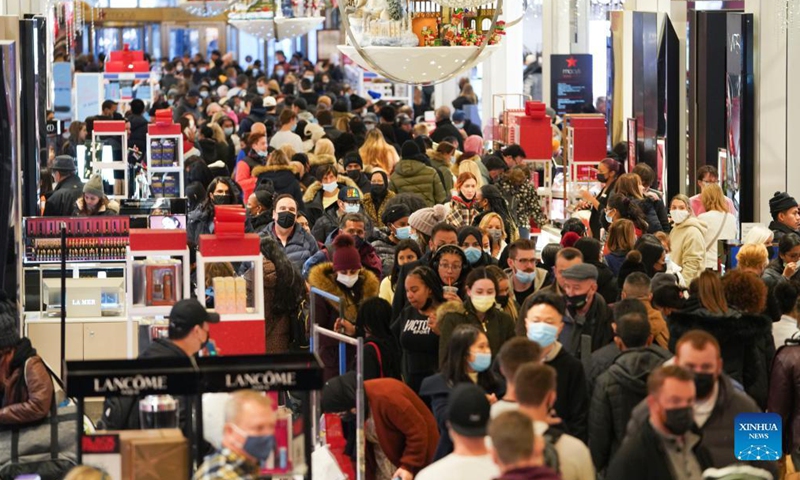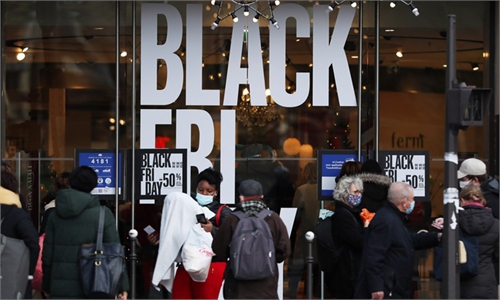Black Friday defeated by Double 11, US may lose title of biggest consumer market to China
US will lose title of biggest consumer market to China as it faces mounting challenges

People shop at Macy's Herald Square store during Black Friday in New York, the United States, Nov 26, 2021.Photo:Xinhua
As online sales of Black Friday, the biggest shopping spree in the US, declined for the first time in recent years due to a litany of challenges and risks, Chinese analysts said on Sunday that the US may lose its status as the world's largest consumer market to China, where the Double 11 online shopping festival two weeks ago continued to see new sales records.
The two shopping festivals are considered to epitomize the consumer market and consumption power in China and the US. The comparison in sales figures is an ominous signal for the US, as China may grab the crown of the biggest consumer market in the world from the US, said analysts.
Online sales in the US totaled about $8.9 billion this Black Friday, down slightly from $9 billion in 2020, according to Adobe Analytics, which tracked 80 of the top 100 US retailers.
Weak Black Friday sales in the US has also been reflected by Chinese exports. Last year's Black Friday exports saw weak demand, and in 2021, exports still have not recovered to 2019 levels, a manager surnamed Sun at an e-commerce platform focusing on exports based in East China's Jiangsu Province, told the Global Times on Sunday.
The platform serves as an export agent for domestic small household appliances, small sports equipment and other commodities sent to the US.
"The total volume of goods exported decreased by 30 to 40 percent in the 2021 Black Friday compared with 2019, but the total value of exports decreased by only 20 percent," said Sun.
Meanwhile, the prices of shipments skyrocketed from the levels of 2019. Customers either bought fewer items or raised prices when selling in the US market, or they did both, said Sun.
Adobe expects e-commerce sales of Cyber Monday this year to be between $10.2 billion and $11.3 billion. Cyber Monday is the biggest online shopping day in the US, and e-commerce companies in recent years used Black Friday's afterglow to attract consumers.
The total online sales of the US shopping festival are expected to be about $20 billion based on Adobe's forecast.
In comparison, the online transaction value of the 2021 Double 11 event stood at 965.12 billion yuan ($140 billion), up 12.22 percent year-on-year, according to e-commerce industry statistics.
"The poor management of the COVID-19 pandemic in the US is the main reason that led to a year-on-year decline in Black Friday sales. Behind this is a turning point in the economic development and recovery of the US, and a severe challenge to its monetary easing," Zhang Xiaorong, director of the Beijing-based Cutting-Edge Technology Research Institute, told the Global Times on Sunday.
Economic strength, willingness to consume, and convenience are the main constraints on demand. The e-commerce sector in the US cannot guarantee smooth logistics as in China, which affected online sales, analysts said. Sales at retailers did not recover, as the pandemic prevention and control in the US was ineffective, they added.
Customer visits to stores during Black Friday were up 47.5 percent from 2020, but still down 28.3 percent from the pre-pandemic 2019 level, according to statistics from Sensormatic Solutions.
On Thursday, which was Thanksgiving Day, visits to brick-and-mortar retailers fell 90.4 percent from the 2019 level. Retailers including Target, Walmart and Best Buy closed due to the COVID-19 and staff shortages, per Sensormatic Solutions.
The recent shootings in several shopping malls in the US also reduced consumers' enthusiasm for visiting stores.
Furthermore, the US supply chain remains under pressure.
As of Friday, out-of-stock listings on retail websites were up 124 percent from pre-pandemic levels, with appliances, electronics, household goods and home and garden supplies showing some of the highest out-of-stock rates, Adobe said, noting that inventory levels at some companies have not improved as supply chains remain disrupted.
But China's supply chain and logistics system have withstood pressure and have not been interrupted by the epidemic, which can meet consumer demand at home and also overseas.
Even in October and November in 2020 when many countries had not recovered from the COVID-19 pandemic, many Chinese manufacturing enterprises, especially those for small household appliances, were busy with overseas orders.



